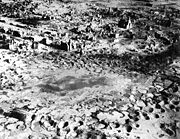
Bombing of Wesel in World War II
Encyclopedia

Wesel
Wesel is a city in North Rhine-Westphalia, Germany. It is the capital of the Wesel district.-Division of the town:Suburbs of Wesel include Lackhausen, Obrighoven, Ginderich, Feldmark,Fusternberg, Büderich, Flüren and Blumenkamp.-History:...
was heavily bombed in Allied air raids during World War II
World War II
World War II, or the Second World War , was a global conflict lasting from 1939 to 1945, involving most of the world's nations—including all of the great powers—eventually forming two opposing military alliances: the Allies and the Axis...
. Between this and the attacks in support of the crossing of the Rhine, the town was devastated.
Wesel became a target of the Allies
Allies of World War II
The Allies of World War II were the countries that opposed the Axis powers during the Second World War . Former Axis states contributing to the Allied victory are not considered Allied states...
, particularly in its strategic position as a depot
Distribution center
A distribution center for a set of products is a warehouse or other specialized building, often with refrigeration or air conditioning, which is stocked with products to be redistributed to retailers, to wholesalers, or directly to consumers. A distribution center is a principal part, the order...
with bridges on the Rhine. On the 16, 17, 18 and 19 February 1945, the town was attacked by the Royal Air Force
Royal Air Force
The Royal Air Force is the aerial warfare service branch of the British Armed Forces. Formed on 1 April 1918, it is the oldest independent air force in the world...
with impact and air-burst weapons and almost entirely destroyed.
The Rhine and Lippe
Lippe River
The Lippe is a river in North Rhine-Westphalia, Germany. It is a right tributary of the Rhine and in length.The source is located at the edge of the Teutoburg Forest in Bad Lippspringe close to the city of Paderborn. It runs westward through Paderborn, Lippstadt and then along the northern edge...
bridges were blown by the Wehrmacht
Wehrmacht
The Wehrmacht – from , to defend and , the might/power) were the unified armed forces of Nazi Germany from 1935 to 1945. It consisted of the Heer , the Kriegsmarine and the Luftwaffe .-Origin and use of the term:...
; among others, on 10 March 1945. The 1,950m long railway bridge was the last Rhine bridge remaining in German hands.
On 23 March, Wesel came under the fire of over 3,000 guns when it was bombarded anew, in preparation for Operation Plunder
Operation Plunder
Commencing on the night of 23 March 1945 during World War II, Operation Plunder was the crossing of the River Rhine at Rees, Wesel, and south of the Lippe River by the British 2nd Army, under Lieutenant-General Sir Miles Dempsey , and the U.S. Ninth Army , under Lieutenant General William Simpson...
. That day 80 Lancasters from No. 3 Group RAF
No. 3 Group RAF
Number 3 Group of the Royal Air Force was an RAF group first active in 1918, again in 1923-26, part of RAF Bomber Command from 1936 to 1967, and part of RAF Strike Command from 2000 until it disbanded on 1 April 2006.-The 1930s and World War II:...
attacked Wesel Then that night of 23/24 March, 195 Lancaster
Avro Lancaster
The Avro Lancaster is a British four-engined Second World War heavy bomber made initially by Avro for the Royal Air Force . It first saw active service in 1942, and together with the Handley Page Halifax it was one of the main heavy bombers of the RAF, the RCAF, and squadrons from other...
s and 23 Mosquito
De Havilland Mosquito
The de Havilland DH.98 Mosquito was a British multi-role combat aircraft that served during the Second World War and the postwar era. It was known affectionately as the "Mossie" to its crews and was also nicknamed "The Wooden Wonder"...
s of RAF Bomber Command
RAF Bomber Command
RAF Bomber Command controlled the RAF's bomber forces from 1936 to 1968. During World War II the command destroyed a significant proportion of Nazi Germany's industries and many German cities, and in the 1960s stood at the peak of its postwar military power with the V bombers and a supplemental...
No. 5 Group
No. 5 Group RAF
No. 5 Group was a Royal Air Force bomber group of the Second World War, led during the latter part by AVM Sir Ralph Cochrane.-History:The Group was formed on 1 September 1937 with headquarters at RAF Mildenhall....
aided in the softening up of the German defenders. 97% of the town was destroyed before it was finally taken by Allied troops and the population had fallen from almost 25,000 in 1939 to 1,900 in May 1945.
The town was taken quickly with 36 civilian casualties only. Field-Marshal Montgomery
Bernard Montgomery, 1st Viscount Montgomery of Alamein
Field Marshal Bernard Law Montgomery, 1st Viscount Montgomery of Alamein, KG, GCB, DSO, PC , nicknamed "Monty" and the "Spartan General" was a British Army officer. He saw action in the First World War, when he was seriously wounded, and during the Second World War he commanded the 8th Army from...
said of the bombing of "The bombing of Wesel was a masterpiece, and was a decisive factor in making possible our entry into the town before midnight."

